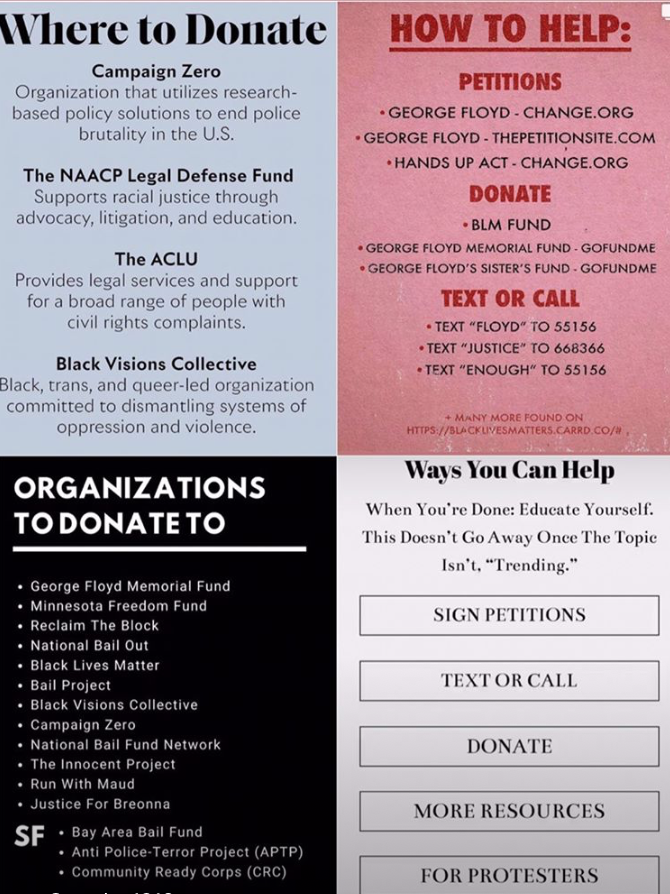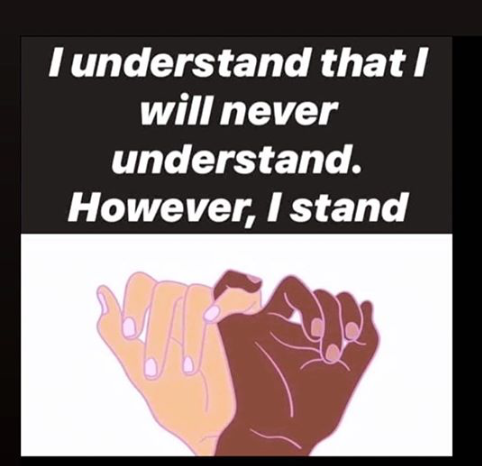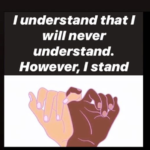Now is a time to educate yourself (and others) with supportive, empowering, and most importantly…*CORRECT* information! My fiancé and I have recently been watching a ton of documentaries, tv-shows, movies, that we both HIGHLY recommend you watch too!
- “The Innocence Files.” — The untold personal stories behind eight cases of wrongful conviction that the Innocence Project and organizations within the Innocence Network have uncovered and worked to overturn.
- “13th.” — This documentary explores the history of racial inequality in the United States, focusing on the fact that the nation’s prisons are disproportionately filled with African-Americans.
- “When they see us.” — In 1989 a jogger was assaulted and raped in New York’s Central Park, and five young people were subsequently charged with the crime. The quintet, labeled the Central Park Five, maintained its innocence and spent years fighting the convictions, hoping to be exonerated. This limited series spans a quarter of a century, from when the wrongfully convicted teens are first questioned about the incident in the spring of 1989, going through their exoneration in 2002 and ultimately the settlement reached with the city of New York in 2014.
- “The help.” — In 1960s Mississippi, a young southern white girl, returns from college with dreams of being a writer. She turns her small town on its ear by choosing to interview the black women who have spent their lives taking care of prominent white families. Turns out, they have quite a lot to say.
- “Whose Streets”: — dives into the Black Lives Matter uprisings in Ferguson
Please comment any others you recommend! They are truly heart wrenching to watch and think know so many have suffered in a similar way. The justice system has failed too many.. Not only do these educate you on current issues, but show you how so many have been wronged in history. So many people are naive to the injustices, but once learned, can help to make a change for the better.
TIME has curated lists on books to read and movies to watch to teach yourself about racism and protest history. Suggested literature includes the Ta-Nehisi Coates memoir Between the World and Me as well as a children’s version of Ibram X. Kendi’s bestseller How to Be an Antiracist, called Anti-Racist Baby (to be published June 16.)
I have a list of where/how you can get involved and help…
1. Donate to help protestors:
Bail funds have had a particularly busy two weeks as thousands of protesters have been detained across the U.S. These funds are typically collectives driven by volunteers working to raise money to free people incarcerated on bail, as well as to advocate for systemic bail reform.
In the aftermath of Floyd’s death, many bail funds, like the Minnesota Freedom Fund, have been inundated with donations and are now suggesting that donors redirect their money to other bail funds and organizations in need. But many say they still need help.
You can choose to donate to a bail fund in your city or state; the National Bail Fund Network lists a number of bail funds by state.
You can give money to national bail organizations, like National Bail Out and The Bail Project, or other groups focusing on helping specific communities, like the Black Trans Protesters Emergency Fund or the LGBTQ Fund.
ActBlue—a nonprofit that facilitates small-dollar donations online, often to progressive groups—has organized a way for people to split donations between up to more than 70 groups at once, including community bail funds, mutual aid funds, and racial justice organizers.
2. You can directly help grieving families whose loved ones have been unjustly killed by giving to fundraisers set up to help cover the costs of funeral and legal expenses, grief counseling and often to set up educational or memorial grants in honor of those who have been killed.
Philonise Floyd has set up a memorial fund for his brother, George Floyd. You can donate to Floyd’s family through this GoFundMe.
Ahmaud Arbery was shot and killed while running in a residential area in South Georgia on Feb. 23. Gregory McMichael and his son, Travis McMichael, were charged with murder and aggravated assault in Arbery’s death after video footage of the incident circulated on social media and sparked national outrage. You can donate to Arbery’s family through this GoFundMe.
The uproar over Floyd’s killings has raised concerns about why black women and girls may still be an afterthought amid widespread outrage over police killings. Breonna Taylor, an EMT who aspired to be a nurse, was sleeping when a police officer shot and killed her in March. You can donate to Taylor’s family through this GoFundMe.
David McAtee was known for offering free meals to police officers in Louisville. He was fatally shot as the police and National Guard responded to protesters. The Louisville police chief was fired earlier this month after the mayor learned police officers involved in the shooting had not activated their body cameras during the incident. (Authorities had said law enforcement was returning McAtee’s gunfire.) You can donate to McAtee’s family through this GoFundMe.
Please list any more you know of in the comment section!!!!!

3. You can certainly help show support by purchasing from black owned companies (Restaurant’s, Cosmetics/skincare/makeup and beauty brands, Clothing – etc!) especially now, helping brands/stores to stay operational during the pandemic.

4. Sign petitions online, send texts, make phone calls, attend local events. Become more involved in political action to stand up for what you believe in. If you do participate in any in-person activism…If you plan to protest through these or any other organizations, be sure to know your rights .
The bottom line is: We, as a whole, can do better.
And remember to ALWAYS be kind.






